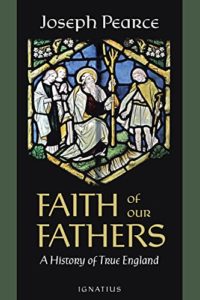Podcast: Play in new window | Download (Duration: 39:22 — 27.1MB) | Embed
Subscribe: Apple Podcasts | Spotify | Amazon Music | Android | Pandora | iHeartRadio | JioSaavn | Podchaser | Gaana | Podcast Index | Email | TuneIn | Deezer | Anghami | RSS | More

Joseph Pearce – Faith of Our Fathers on Inside the Pages with Kris McGregor
Joseph Pearce discusses his book “Faith of Our Fathers,” exploring the history of Catholic England. Viewing history through God’s omnipresence, he makes historical figures like Alfred the Great feel present. Detailing the early Christian influence in England, with figures like St. Joseph of Arimathea and sites like Glastonbury, Pearce praises the poetic heritage of England, highlighting writers like Chaucer and Shakespeare, and the deep Catholic roots reflected in their works.
He touches on the resilience of English Catholics through centuries of persecution, viewing it as a period of glory despite its brutality. Pearce also notes the blend of languages and cultures in English history, influencing modern English and the enduring spiritual and cultural legacy of Catholic England.
You can find the book here.
Discerning Hearts Reflection Questions
- God’s Omnipresence in History How does viewing history through God’s omnipresence change our perception of historical events and figures?
- Early Christian Influences In what ways can we see early Christian influences in England’s history and culture?
- Catholic Roots in Literature How do the works of poets like Chaucer and Shakespeare reflect the Catholic roots of England?
- Resilience of English Catholics What lessons can we learn from the resilience of English Catholics during periods of persecution?
- Language and Culture Blend How has the blend of languages and cultures in English history shaped modern English?
- Spiritual Heritage Sites What is the significance of sites like Glastonbury in understanding the spiritual heritage of England?
- Inspiration from Historical Faith How can the historical examples of faith and perseverance inspire our own spiritual journey?
- Legacy of Catholic England In what ways does the cultural legacy of Catholic England continue to impact the world today?
From the book description:
“The Catholic Church has been a part of English history since the arrival of Christian missionaries to Roman Britain in the first century after Christ. England was evangelized in these early centuries to such an extent that, by the time the Romans withdrew in the fifth century, the Celtic population was largely Catholic.
Anglo-Saxon England, prior to the Norman Conquest, was a land of saints. From St. Bede, with his history of the early Church, to the holy king St. Edward the Confessor, Saxon England was ablaze with the light of Christ. During the reign of St. Edward, a vision of the Virgin at Walsingham placed the Mother of God on the throne as England’s queen, the land being considered her dowry. Even following the Norman Conquest, the Faith continued to flourish and prosper, making its joyful presence felt in what would become known as Merrie England.
Then in the sixteenth century, this Catholic heart was ripped from the people of England, against their will and in spite of their spirited and heroic resistance, by the reign of the Tudors. This made England once again a land of saints—that is, of martyrs, with Catholic priests and laity being put to death for practicing the Faith. The martyrdoms would continue for 150 years, followed by a further 150 years of legal and political persecution.
In the nineteenth century, against all the odds, there was a great Catholic revival, heralded by the conversion of St. John Henry Newman, which would continue into the twentieth century. Much of the greatest literature of the past century has been written by literary converts to the Church, such as G. K. Chesterton, Evelyn Waugh, Graham Greene, and J. R. R. Tolkien.
This whole exciting, faith-filled story is told by Joseph Pearce within a single-volume history of “true England”, the England that remained true to the faith through thick and thin, in times both “merrie” and perilous. It is a story not only worth telling but worth celebrating.”



